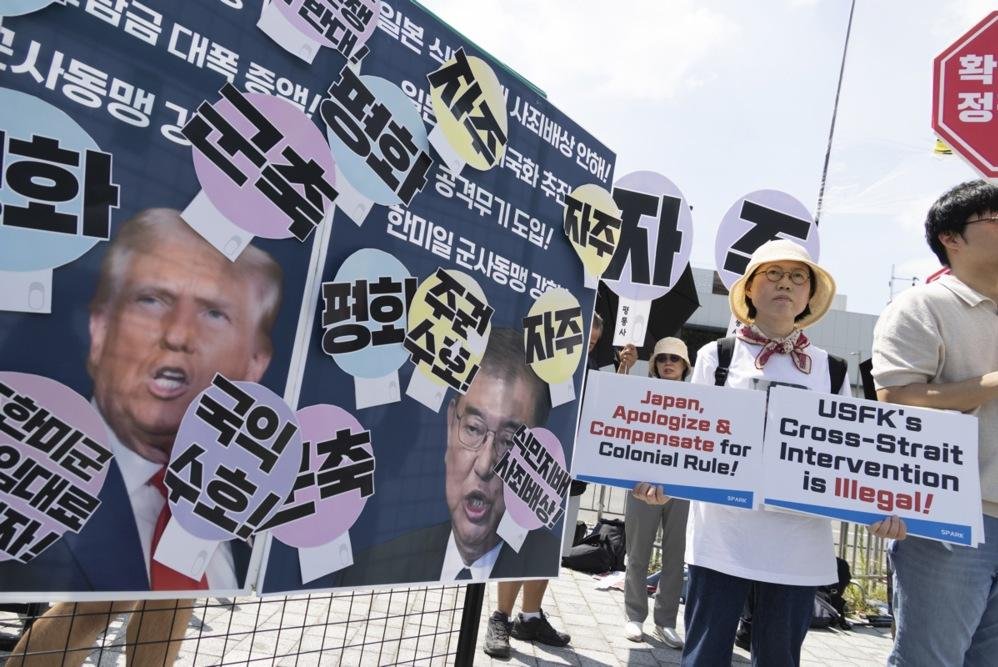Members of Korean Peace Solidarity for Sovereignty and Reunification hold up signs Friday reading “Against the South Korea, U.S and Japan military alliance” during a rally against U.S. President Trump’s defense policy toward South Korea, outside the presidential office in Seoul. Photo by Jeon Heon-kyun/EPA
SEOUL, Aug. 22 (UPI) — President Lee Jae Myung’s address marking the 80th anniversary of Korean people’s liberation was meant to inspire confidence at a time of profound uncertainty. Instead, it revealed how out of step he and his advisers remain with the realities reshaping the Korean Peninsula and the world.
His lofty rhetoric about dialogue with Pyongyang and dreams of reconciliation only underscored how dangerously shortsighted his government has become.
The North’s response was telling. Kim Yo Jong, sister of Kim Jong Un, made clear that Pyongyang no longer considers unification a national goal. To the regime, South Korea is an adversary to be contained, not a partner to be embraced.
For South Korea to pursue the old progressive playbook — warming ties through symbolic gestures and hopeful summits — is to chase an illusion even North Korea has abandoned, and in doing so, to cement the division of two states.
The international context makes this delusion even more perilous. Under President Donald Trump, Washington is not simply recalibrating its policy on the Korean Peninsula; it is reshaping the global order.
Through tariffs and a muscular trade policy, the United States is redefining the architecture of international commerce, forcing allies and rivals alike to reconsider their economic dependencies. For South Korea, hemmed in by slowing growth, a declining population, and deepening internal polarization, the stakes could not be higher.
American policymakers, too, must resist the temptation to indulge Lee’s misplaced optimism. Past U.S. administrations have sometimes allowed South Korean progressives to pursue engagement with Pyongyang under the banner of alliance solidarity, even when the result was only disappointment and strategic drift.
The “sunshine policy” experiments of the early 2000s brought photo opportunities and fleeting public euphoria but failed to change Pyongyang’s behavior. Billions of dollars in aid were funneled northward while the regime continued expanding its nuclear arsenal.
To repeat that mistake now would not only embolden North Korea’s intransigence but also weaken Washington’s effort to build a coherent Indo-Pacific strategy. The United States should make clear that its support rests on sober realism, not sentimental gestures.
Yet, Lee compounds the danger by leaning toward Beijing at precisely the moment when South Korea should be strengthening its role in a values-based coalition of democracies.
His administration’s overtures to China — couched as pragmatic diplomacy — risk binding Seoul to a power that undermines the very principles of freedom and sovereignty that Koreans fought to reclaim 80 years ago.
Beijing has repeatedly used economic coercion to discipline countries that challenge its policies, from punishing Australia over calls for a COVID-19 origins inquiry to retaliating against Lithuania for opening ties with Taiwan. To misread China’s ambitions as benign is as reckless as misreading Pyongyang’s hostility.
The warning signs are unmistakable. Domestically, South Korea is wrestling with one of the world’s fastest-aging populations and a birthrate that has collapsed to record lows. The social safety net is already under immense strain, and projections suggest that by mid-century, the nation’s population could shrink by nearly one-third.
Economically, global headwinds and the restructuring of supply chains threaten the foundations of its export-driven prosperity. The semiconductor industry, long the crown jewel of Korean competitiveness, now faces mounting U.S. pressure to align with Washington’s export controls on China, supply chain restructuring and demands for greater investment in America.
Politically, the country remains riven by ideological divides that prevent consensus on foreign policy or even national purpose. Against this backdrop, Mr. Lee’s attempt to recycle the language of past progressive administrations — dialogue, détente and a manufactured “mood” of unification — looks detached from both history and present reality.
At a recent international gathering in Seoul marking the 80th anniversary of Korea’s liberation, Moon Hyun Jin, chairman of the Global Peace Foundation, delivered a strikingly different message.
He urged Koreans to transcend partisan divisions and root their future in the civilizational vision of Hongik Ingan — “to live for the benefit of all humanity.” His appeal was not for another round of empty summits with Pyongyang, but for Korea to rise as a model nation, one capable of uniting its own people and contributing to global renewal.
That vision stands in sharp contrast to Lee’s narrow, ideological approach. To cling to outdated assumptions about the North, to ignore the profound transformation underway in Washington, and to flirt with Beijing as if China offered a safe harbor — all of this is not simply naïve. It is an abdication of leadership.
History will not be kind to leaders who mistake wishful thinking for strategy. If Lee proceeds with a meeting in Washington armed only with the talking points of past progressive governments, he will not be remembered as a peacemaker, but as the man who led South Korea to the edge of irrelevance.
At this most consequential time, Korea faces not only the risk of decline and even national extinction, but also the greatest opportunity in its modern history. In moments of crisis, it has always been the Korean people themselves who rose to safeguard their nation.
Today, they must once again become the owners of the Korean Dream, exercising a higher spiritual leadership to transform danger into opportunity, achieve unification and realize the ancient ideal of Hongik Ingan.
